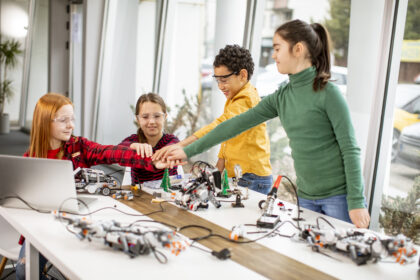Introduction
In a bid to enhance STEM education across Europe, UNESCO and Huawei Technologies have selected five groundbreaking projects under their joint initiative, “Revitalizing STEM Education to Equip Next Generations with STEM Competency.” This initiative aims to revolutionize STEM learning to address pressing societal needs and global challenges, aligning with the 2030 Agenda and Sustainable Development Goals (SDGs), particularly SDG 4 – Quality Education, SDG 5 – Gender Equality, and SDG 9 – Industry, Innovation, and Infrastructure.
The Initiative’s Objectives
The collaborative project seeks to:
- Rethink and revitalize the STEM learning model.
- Address critical global challenges through innovative educational practices.
- Support the achievement of the 2030 Agenda and SDGs.
Selected Projects
After evaluating 37 proposals from various STEM education stakeholders, the Supervisory Board has chosen five projects for their potential to significantly impact STEM education across Europe. Here’s a closer look at each project:
- Gender and STEM Education in Romania (Belgium, Romania)
- Overview: This project aims to enhance gender-integrated STEM education in Romania.
- Leading Institutions: Hermann Oberth German International School, Digital Leadership Institute, Association of Women in Engineering, Science and Technology.
- Objective: To fortify Romania’s role in promoting gender equality within STEM fields.
- Advancing Innovative STEM Education and Research in Earthquake Engineering towards Sustainable Environment: QUAKESAFE (North Macedonia)
- Overview: Led by Ss. Cyril and Methodius University in Skopje, this initiative focuses on earthquake engineering education.
- Objective: To advance sustainable environmental practices through innovative research and education in earthquake engineering.
- Integrating and Supporting STEM in the Educational Curriculum through UNESCO Microscience Experiments Project (Romania)
- Overview: This project aims to integrate microscience experiments into Romanian schools.
- Leading Institution: International Centre for Advanced Training and Research in Physics.
- Objective: To enhance practical STEM learning through hands-on experiments.
- Teaching Primary Mathematics through Problem-solving using Lesson Study (Malta)
- Overview: The Ministry for Education of Malta, in collaboration with the University of Malta, will improve mathematics teaching.
- Objective: To enhance problem-solving skills in primary mathematics education through a professional development program.
- TechBridge: Empowering Refugees and Migrants in Europe through Digital Education and Job Market Integration (Germany)
- Overview: Operated by ReDI School of Digital Integration gGmbH, this project focuses on empowering refugees and migrants.
- Objective: To provide advanced STEM skills and facilitate job market integration for refugees and migrants in Europe.
Conclusion
The five selected projects reflect a commitment to modernizing STEM education through innovative solutions and international collaboration. By integrating diverse approaches and sharing best practices, UNESCO and Huawei Technologies are paving the way for a more effective and inclusive STEM education landscape in Europe.






